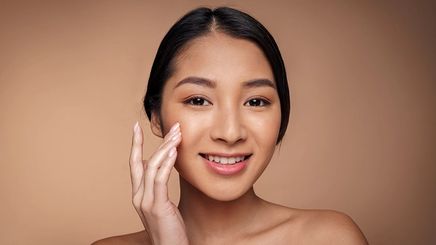
Vitamins have a profound effect on your body. They keep your health in check, from boosting your immune system and helping you see better in the dark to leveling your anxiety and improving your skin. There is literally an alphabet of vitamins available, so you might find yourself confused as you wander through the drugstore aisles seeing all sorts of vitamins on lotions, serums, and sheet masks. How do vitamins for skin work, exactly?
Ingesting Versus Applying Vitamins for Skin
Drink your vitamins. You heard this every time your parent would hand you your post-breakfast Flintstones chewable. However, when it comes to nutrients, the official party line is to maintain a proper diet. A healthy meal that is chock-full of fresh fruits and vegetables is more than enough of a guarantee that you’re taking in your required dose of vitamins.
There’s no harm in supplementing your skin care with vitamins, though. An ingestible vitamin cannot and will not isolate and aid your skin alone. It will be broken down throughout your body and might not reach your skin. In this case, applying them topically via a vehicle like a moisturizer would be more effective. Your skin type or woe deserves specialized attention.
If your skin concern is a consequence of an underlying condition, then you should consult with a dermatologist for a solution.
The 5 Best Vitamins for Your Skin
Vitamins are not created equal. Each type serves a specific purpose and skin goal. Here’s a quick guide to the most common vitamins for skin and how you can use them.
Vitamin E: Alpha-Tocopherol
is one of the most popular vitamins for skin. It is an antioxidant, which means it helps protect the skin from environmental aggressors and free radicals, particularly from UV rays. It’s also an effective moisturizer, repairing the skin barrier and boosting hydration.
You can use Vitamin E for the following:
- Evening skin tone
- Improving collagen production, making it effective against fine lines
- Slowing down damage from free radicals
Vitamin A: Retinoid
Accelerating cell turnover is ’s most popular role. There’s a reason dermatologists love Vitamin A. It’s extensively studied and, according to Harvard Health, has been proven to delay the signs of aging, among other things. Retinoid is powerful stuff and should be used incrementally since it can irritate your skin. It also increases your skin’s sensitivity to the sun, so avoid using it during the daytime.
If you’re new to retinoid use, you can add it into your night routine once a week then build it up as your skin gets used to it. Some of Vitamin A’s benefits include:
- Strengthening collagen
- Fading fine lines
- Brightening and evening skin tone
- Minimizing breakouts
- Preventing acne formation
Vitamin C: L-Ascorbic Acid
Like Vitamin E, is an antioxidant. This means it can also neutralize free radicals that can break down cells and cause serious damage to your skin. According to research in the Yale Journal of Biology and Medicine, L-ascorbic acid also promotes new formation making it a potent anti-aging ingredient. In 2017, a study in Nutrients surveyed users of topical Vitamin C for three months and noticed overall skin improvement, from smoothening texture to evening color.
Vitamin C has been gaining fans in the skincare world for its numerous benefits, which include:
- Reducing the appearance of dark spots and brightening the skin
- Being an anti-inflammatory, helping reduce redness
- Helping balance the skin’s oil levels
- Protecting the skin from ultraviolet rays
- Fading fine and coarse wrinkles
- Boosting collagen formation
Vitamin B3: Niacinamide
One of the holy grail vitamins for skin, Niacinamide is a form of Vitamin B3. It is a cult favorite of beauty girls everywhere. This vitamin’s most famous promise is its skin-brightening properties as well as its ability to help nourish and hydrate the skin. Some of N include:
- Reducing acne
- Brightening skin and reducing dark spots, uneven skin tone, and redness
If your goal is to , then niacinamide will take you on that path. POND'S Aloe Vera Jelly Cleanser teams aloe vera and Vitamin B3 to clean your skin while keeping it hydrated. It’s a dual-tasker that revives dry and dull skin and helps make it glow.
Vitamin K1 and K2: Phylloquinone and Menaquinone
This pair may not be superstars in skin care – yet – but they are definitely pulling their weight. Generally, Vitamin K’s primary job is to manage blood clots and help repair wounds and bruises. According to a 2014 study in the Indian Journal of Pharmacology, its capability to quicken skin healing makes it effective in treating scars, spider veins, and stretch marks. Some research also suggests that it helps renew collagen production. You can use Vitamin K for the following:
- As an anti-inflammatory, which helps reduce redness
- Brightening dark under-eyes
- Fading scars and stretchmarks
Vitamins for skin are more effective in combination with each other or with other compounds such as hyaluronic acid or folic acid. For example, Vitamins A and E work well together since the latter counteracts the irritating effect of the former. Figure out your skin type via and assess your skin concerns. Now that you know what these vitamins can do for your skin, you can make more informed choices regarding your skin care.